Here on Cape Cod, the hurricane is just a summer storm, mostly passed by. I had fallen into a lovely rhythm of early morning reading and writing, a swim, a meal, repeat. But this morning, my laptop refused to start, and despite the best efforts of Apple support, refused again and again.
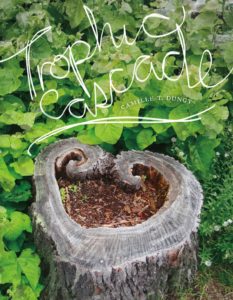 On my own for a few days, I was startled to discover how bereft I felt–the laptop has been my workhorse, my tool. I read and write largely on my laptop. I didn’t even bring a notebook. But I gave up, went to the ocean for a long walk by the wonderfully crashing stormy waves, came back, and miraculously, it’s working again.
On my own for a few days, I was startled to discover how bereft I felt–the laptop has been my workhorse, my tool. I read and write largely on my laptop. I didn’t even bring a notebook. But I gave up, went to the ocean for a long walk by the wonderfully crashing stormy waves, came back, and miraculously, it’s working again.
I can get back to work, and am publishing this wonderful poem by Camille Dungy a day early, in case this respite is temporary.
Trophic Cascade
After the reintroduction of gray wolves
to Yellowstone and, as anticipated, their culling
of deer, trees grew beyond the deer stunt
of the mid century. In their up reach
songbirds nested, who scattered
seed for underbrush, and in that cover
warrened snowshoe hare. Weasel and water shrew
returned, also vole, and came soon hawk
and falcon, bald eagle, kestrel, and with them
hawk shadow, falcon shadow. Eagle shade
and kestrel shade haunted newly-berried
runnels where mule deer no longer rummaged, cautious
as they were, now, of being surprised by wolves. Berries
brought bear, while undergrowth and willows, growing
now right down to the river, brought beavers,
who dam. Muskrats came to the dams, and tadpoles.
Came, too, the night song of the fathers
of tadpoles. With water striders, the dark
gray American dipper bobbed in fresh pools
of the river, and fish stayed, and the bear, who
fished, also culled deer fawns and to their kill scraps
came vulture and coyote, long gone in the region
until now, and their scat scattered seed, and more
trees, brush, and berries grew up along the river
that had run straight and so flooded but thus dammed,
compelled to meander, is less prone to overrun. Don’t
you tell me this is not the same as my story. All this
life born from one hungry animal, this whole,
new landscape, the course of the river changed,
I know this. I reintroduced myself to myself, this time
a mother. After which, nothing was ever the same.
Camille Dungy
From the book, Trophic Cascade, Wesleyan University Press, 2018
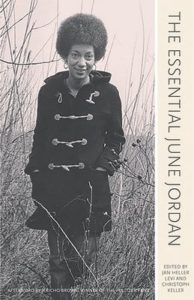 There’s a new selection of June Jordan’s poetry out, The Essential June Jordan. Here is a short sample–a poem I love for so many reasons, not least because of the way the complexity of title plays against the simplicity of the poem:
There’s a new selection of June Jordan’s poetry out, The Essential June Jordan. Here is a short sample–a poem I love for so many reasons, not least because of the way the complexity of title plays against the simplicity of the poem: On my own for a few days, I was startled to discover how bereft I felt–the laptop has been my workhorse, my tool. I read and write largely on my laptop. I didn’t even bring a notebook. But I gave up, went to the ocean for a long walk by the wonderfully crashing stormy waves, came back, and miraculously, it’s working again.
On my own for a few days, I was startled to discover how bereft I felt–the laptop has been my workhorse, my tool. I read and write largely on my laptop. I didn’t even bring a notebook. But I gave up, went to the ocean for a long walk by the wonderfully crashing stormy waves, came back, and miraculously, it’s working again.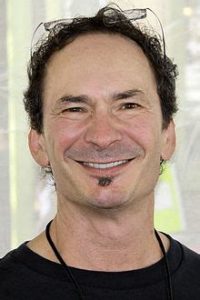 I reviewed Forrest Gander’s recent book,
I reviewed Forrest Gander’s recent book, 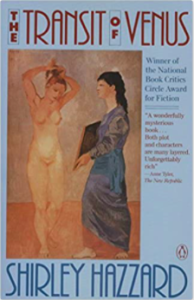 It’s been a long time since I’ve posted an exemplary sentence, but The Transit of Venus, by Shirley Hazzard, is full of them. Very arch, and often funny. I’m only about half-way through, but here are a few:
It’s been a long time since I’ve posted an exemplary sentence, but The Transit of Venus, by Shirley Hazzard, is full of them. Very arch, and often funny. I’m only about half-way through, but here are a few: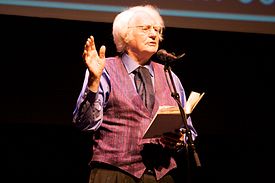 I love this form that tells a story but is more than a story. When it works, it really works, as this, by Robert Bly:
I love this form that tells a story but is more than a story. When it works, it really works, as this, by Robert Bly: This has been a week a travel, visiting family and childhood friends I haven’t seen since before the lockdown. Often the part of our catching up is about health, what one friend calls “the organ recital.” This poem, then, feels appropriate:
This has been a week a travel, visiting family and childhood friends I haven’t seen since before the lockdown. Often the part of our catching up is about health, what one friend calls “the organ recital.” This poem, then, feels appropriate: